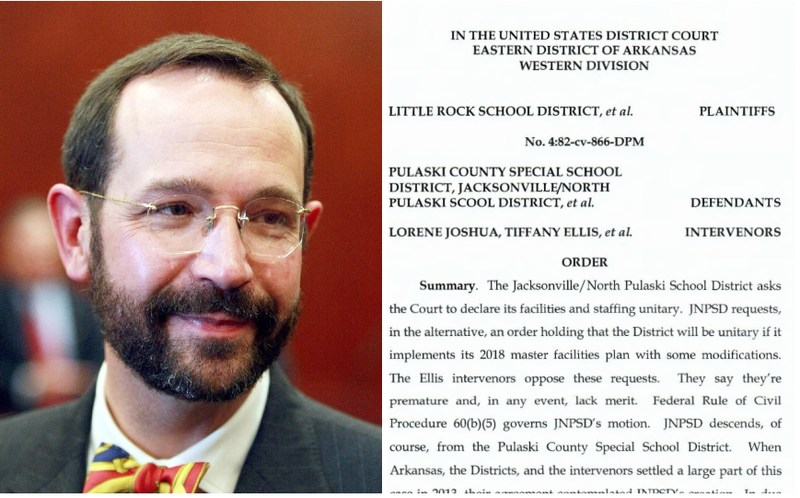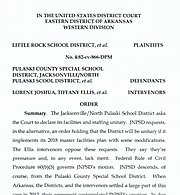The Jacksonville/North Pulaski County School District is entitled to be released from federal court supervision on all staffing practices but one, and is on its way to being freed on facilities issues by 2026, U.S. District Judge D. Price Marshall Jr. said Tuesday.
Marshall issued a 20-page order to that effect in response to the district's request a year ago that he declare the 4,000-student district unitary -- or in compliance with its desegregation obligations -- in those two areas.
Marshall presided over a five-day hearing on the request in February. It was the first request by the district that began operating in July 2016 but that inherited the desegregation obligations of the Pulaski County Special School District, from which it detached.
The Pulaski County Special district, an original party in the ongoing 35-year-old desegregation lawsuit, was declared unitary in staffing last year and is working on resolving discrepancies between its facilities in majority-black areas and its facilities in majority-white areas, in the hope of being freed from supervision on that issue as well.
Once the staffing and facilities issues are resolved, the court will focus on the remaining, more complicated issues of discipline and student achievement before deciding whether either district can be totally released from federal supervision.
Scott Richardson, an attorney for the new district, said Tuesday that he considers Marshall's order "a very big deal" and that the district "feels very good about it."
But attorney John Walker, who represents the Ellis intervenors, the modern-day representatives for the class of black students in the long-running lawsuit, said Tuesday that he'll ask Marshall to reconsider allowing the Jacksonville/North Pulaski County district to become unitary if it complies with a court-modified version of its 2018 master plan.
The original 2018 plan contemplates expanding the district's new high school and middle school from 2023-25, based on projected enrollment growth. It also contemplates replacing all of the district's elementary schools over a period of 16 years.
Marshall modified the plan by requiring the replacement elementary schools to be "completed as quickly as possible," before any phase-two expansion plans at the high school or the middle school, unless both can be done simultaneously without hindering completion of the elementary schools.
He said he agreed with the intervenors that 16 years "is too long to make the children attending Taylor [Elementary], about 70 percent of whom are black, and Bayou Meto [Elementary], more than 80 percent of whom are white, wait for facilities that are equal to other [district] elementary schools," especially the combined replacement for the Tolleson and Arnold Drive elementary schools that opened in August.
He noted that the district has pledged to replace its Taylor and Bayou Meto elementary schools as quickly as possible, ahead of any expansions of the new high school or middle school, but he needs a more definitive statement requiring that if both can't be done at the same time, "then it will build the new elementary facilities first."
Marshall noted that "puts Taylor and Bayou Meto on track for replacement in about eight years."
But that is still too long to wait, Walker said Tuesday.
"We can't wait 10 years for kids in black-majority areas to have the same facilities as kids at the Little Rock Air Force Base," which is in Jacksonville, he said.
"We'll be talking to him about that," Walker said, adding that the intervenors may propose a different modification to the district's 2018 plan.
Walker said he appreciates that the judge "has been thoughtful in his approach," but he said the district's board members, administrators and its attorney, Richardson, "have a long way to go."
"Their good faith is always an issue," he said. "We're trying to make sure that sooner or later they treat black kids in Jacksonville as equally as they do white kids."
Richardson noted that the district's ability to upgrade and replace facilities depends on the state providing funding, as part of the settlement that took the state out of the desegregation lawsuit several years ago. He said facilities funding is based on a complicated combination of the wealth index of the district's property tax base and the district's average daily attendance, which is difficult to determine in the district's early years.
"This really is pretty amazing that they were able to build what they have and to plan to build what they're planning," he said of the new district.
In his order, Marshall also commented on the speed with which the district is progressing.
"[The district's] plan is extraordinary," he said. "Within approximately a dozen years of its creation, the District will have built a new high school, a new middle school, and four new elementary schools. [The district's] good faith is demonstrated by the plan itself and the progress already made. It's not just paper. The new elementary school has opened and the new high school will open next fall. Multi-purpose buildings have been added at Taylor and Bayou Meto because they're at the back of the line for complete replacement. The community hitched up with a 7.6-mill increase in real property taxes. Arkansas is in harness, too, with substantial partnership program funding."
Richardson said the state pays 47 percent of the construction costs for the district's academic spaces but doesn't pay for the construction of non-academic spaces.
He agreed with Marshall's remark that "continued partnership funding, or some equivalent state assistance, is essential for [the district] to meet its desegregation obligations through this solid and reasonable facilities plan. Both horses are necessary to pull this wagon home."
Richardson noted that the Jacksonville/North Pulaski district is now tied for the highest millage rate in the state, at 53 mills dedicated to the school district. He said that's because "the people of the district really committed to the schools and really established their desire to have the best schools possible."
"I just love it," he said. "The Little Rock, North Little Rock and Pulaski County Special school districts rocked along for 20 years before being declared fully unitary. This district has been in existence for two school years, and it's getting unitary. It's a good sign of the district's commitment to its patrons, especially its African-American students and parents."
As far as the district's obligations concerning staffing, Marshall said the district has "substantially complied in good faith" with its obligations to recruit racially diverse applicants for administrator vacancies and teacher vacancies; maintain programs and provide incentives for early childhood, primary grade and secondary core teachers; and avoid racially identifiable schools.
"The Court was impressed with the District's firm intentions, across the board, to eliminate, insofar as practicable, any vestige of segregation in its people," Marshall said. Noting that the law "doesn't require perfection, but rather a continual striving toward a district where there are equal opportunities for teachers and staff of all races," he said he is convinced that the district "is almost there in staffing."
He said the district has fallen short in implementing incentives for recruiting and retaining qualified black applicants and must come up with more incentives than a tuition-reimbursement program for teachers who started in the 2016-2017 school years.
He urged the district to be creative, noting, "When you read the word 'incentives,' money comes to mind. But, in the Court's experience, those who give their lives to teaching our children are motivated by many things other than money."
Noting that the district's superintendent is white, both assistant superintendents are black, most of the non-academic department heads are white, and the 20 principals and assistant principals are of both races, Marshall said, "These circumstances are a long way from the days of white-only school leaders."
Metro on 09/26/2018


